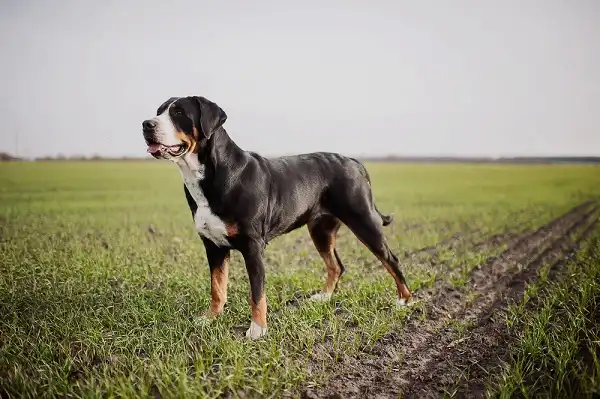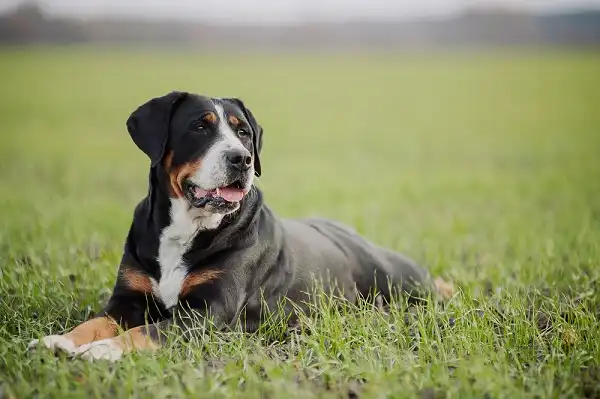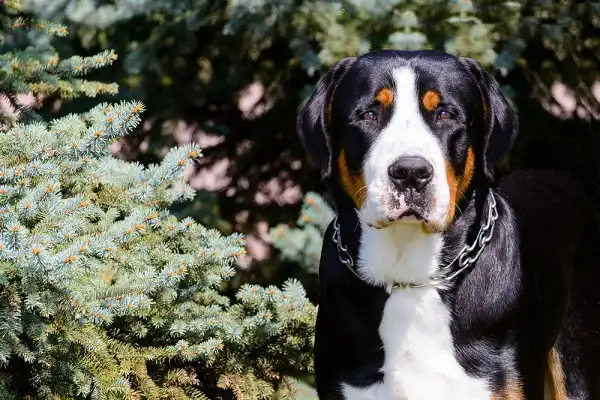If you’re looking for a loyal and gentle companion, the Greater Swiss Mountain Dog might be the breed for you. As one of the oldest breeds of domestic dogs, they have a long history of being versatile working dogs. Today, they make excellent family pets. Keep reading to learn more about this amazing breed!

Greater Swiss Mountain Dog Description
The Greater Swiss Mountain Dog is an impressive and loyal working breed, bred from the large and powerful dogs of the Alps. They have a thick, medium-length coat that is usually tri-colored – black with tan or rust markings on the face, chest, legs, and tail. The Greater Swiss Mountain Dog’s head is broad and flat with a muzzle that tapers toward the nose. They have almond-shaped eyes that are brown in color, and their ears are relatively small in comparison to their head size. The body of this breed is muscular with powerful hindquarters that give them a distinctive gait. Overall, the Greater Swiss Mountain Dog is an incredible pet choice for any home looking for a loyal four-legged friend! They have all the qualities you could want in a dog – intelligence, loyalty, and devotion – along with being gentle giants who love being part of your everyday life.
Greater Swiss Mountain Dog Habitat
The Greater Swiss Mountain Dog is a working breed that originally hails from the Alps, where they were used as herding and protection dogs. This breed requires plenty of space to roam and exercise in order to maintain their physical health and mental well-being. The ideal environment for them should have plenty of open spaces, such as yards or large fields, where they can explore and play. Greater Swiss Mountain Dogs are highly adaptable and can thrive in both rural and urban settings, as long as their needs for physical activity and mental stimulation are met. They need an abundance of activities that stimulate their minds, such as interactive puzzle games or agility training, so it’s important to provide them with these types of outlets on a regular basis. In terms of climate, the Greater Swiss Mountain Dog prefers cooler temperatures but can handle hot temperatures if allowed ample opportunity to remain cool by offering shade or access to water during the warmer months. They do not tolerate extreme cold very well though, as their thick coat will provide enough insulation for temperatures up to about freezing point.
Greater Swiss Mountain Dog Diet
The Greater Swiss Mountain Dog is a large breed that requires a nutritious diet, rich in proteins and carbohydrates, to maintain their health. This breed should be fed twice daily, with high-quality kibble that is specifically designed for large breeds such as the Greater Swiss Mountain Dog. It’s important to provide them with food that has an appropriate balance of vitamins and minerals to support optimal growth and development. In addition to regular meals, treats can be offered as part of their diet; however, these should be given in moderation and be used as rewards for good behavior rather than simply given away freely. For example, fresh fruits and vegetables or small pieces of cooked meats are great options for healthy treats. Overall, the proper nutrition for this breed should include lean proteins from sources such as beef, chicken, or fish; complex carbohydrates like oats, brown rice, or sweet potatoes; healthy fats from oils like olive oil; and plenty of vegetables and fruits. A balanced diet is key to helping your Greater Swiss Mountain Dog remain strong and healthy throughout their life!

Greater Swiss Mountain Dog Size
The Greater Swiss Mountain Dog is a large breed, typically weighing anywhere from 80 to 140 pounds when fully grown. They have an average height of 24 to 28 inches at the shoulder, making them one of the tallest breeds in their class. This muscular dog has a broad chest and head, as well as well-developed muscles throughout their body including their legs and feet. Due to their large stature, it’s recommended that potential owners be mindful of the space necessary when considering adding a Greater Swiss Mountain Dog into the family home – especially if living in apartments or condos without many open spaces available for regular exercise. Additionally, it’s important that these dogs receive proper nutrition throughout their life cycle as diet plays an important role in maintaining optimal growth and development.
Greater Swiss Mountain Dog Lifespan
The Greater Swiss Mountain Dog is a robust and hearty breed, with an average lifespan of 10 to 12 years. While exact lifespans can vary depending on various factors such as diet, exercise, and genetics, with proper care and nutrition this breed can often live beyond 12 years old. These dogs are known to age gracefully, and while they may experience some changes in behavior or physical abilities, their most common health issues tend to manifest later in life. Regular visits to the veterinarian for check-ups, vaccinations, and dental cleanings are essential for maintaining a dog’s overall health and should be done consistently throughout its lifetime. It’s important for potential owners to be aware that although the Greater Swiss Mountain Dog is generally healthy and free from major illnesses, there are a few minor conditions that can affect the breed.
These include hip dysplasia – which is an inherited condition where the hip joint does not form properly – as well as eye problems like Progressive Retinal Atrophy (PRA) or Entropion – which is when eyelids roll inwards causing discomfort or irritation. With trustworthy breeding practices ensuring that all puppies have healthy parents with sound temperaments, combined with a balanced diet rich in nutrients and plenty of regular exercises, owners can rest assured that their Greater Swiss Mountain Dog will lead a long and happy life. Taking the necessary steps towards prevention by scheduling regular vet check-ups will also help guarantee that any developing issues do not go unnoticed until it’s too late.
Greater Swiss Mountain Dog Behavior
The Greater Swiss Mountain Dog is a calm, loyal, and affectionate breed. They are friendly around people, though their size can be intimidating to strangers. This breed is protective of its family and will alert them in the event of danger. However, they are not aggressive and typically only bark when necessary. Their intelligence makes them easy to train and with an appropriate amount of patience, these dogs learn commands quickly. Positive reinforcement is key when training as punishment may have adverse effects and should be avoided. These dogs do best with consistent structure and routine; providing regular exercise along with mental stimulation helps keep them engaged and focused. Greater Swiss Mountain Dogs thrive in active households with plenty of space for them to run free and explore. They enjoy activities such as long walks, hikes or even swimming in ponds or lakes on hot days! They excel at any task that requires strength or endurance such as pulling carts or herding livestock. These dogs also love spending time cuddling up on the couch with their owners – they can be quite clingy and are known to follow their owners around the house out of loyalty! They’re known for being great guard dogs but don’t necessarily make good watchdogs due to their gentle nature – they may bark at loud noises but rarely attempt to attack intruders unless directed by their owner.

Greater Swiss Mountain Dog Speed
The Greater Swiss Mountain Dog is a strong and powerful breed, with a muscular build designed for endurance. These dogs are capable of incredible speeds and can reach up to 20 mph in a sprint. They have an impressive stride length, with their long legs enabling them to cover great distances in relatively short times. Given the proper training and exercise, these dogs are well-suited to compete in agility trials, flyball, rallies, and obedience competitions. While they may not be as fast as other breeds such as Greyhounds or Whippets, their sheer strength and power make them capable of outperforming many others in races and activities requiring speed and stamina. Thanks to their large size, high energy levels, and athletic abilities, Greater Swiss Mountain Dogs require plenty of exercises each day – between 30 minutes to two hours depending on the individual’s needs. This not only helps keep them fit but also encourages positive behaviors while allowing them to release excess energy through playtime or walks. Regular exercise can also help maintain their speed as they age; by consistently providing stimulation and physical activity they will stay physically fit while keeping up with the younger dogs at the park! Overall, the Greater Swiss Mountain Dog is a strong breed that is capable of reaching impressive speeds when given enough opportunity for exercise and training.
Greater Swiss Mountain Dog Hunting
The Greater Swiss Mountain Dog is an ideal hunting companion, thanks to its strength and agility. These dogs have been used in various hunting endeavors for centuries, with owners relying on their sharp senses and relentless loyalty in order to track and capture the game. When it comes to hunting, these dogs are most commonly found chasing after the big game such as deer or boar. They excel at tracking animals over long distances due to their incredible noses that can identify even the smallest of scents. Additionally, they have strong legs that allow them to keep up with a running target while their large size gives them enough strength to tackle it if needed. These dogs also make excellent retrieval dogs when duck or bird hunting.
They have the intelligence and obedience required for this type of work – they can be trained to follow commands from their handler without hesitation in order to fetch downed birds quickly and reliably. When swimming in cold water, the thick double coat of the Greater Swiss Mountain Dog provides insulation from the cold temperatures, allowing them to stay in the water for longer periods of time without discomfort. The Greater Swiss Mountain Dog is also well-suited for small game hunting, specifically rabbits and hares. They have the ability to locate these animals quickly with their incredible sense of smell, as well as having a short burst of speed that allows them to chase down fast-moving targets if needed. Furthermore, they are known for being extremely quiet during hunts which can help hunters avoid scaring away any potential prey before they get close enough to shoot or catch it.

Conclusion
The Greater Swiss Mountain Dog is an incredible breed that combines intelligence, loyalty, and athleticism. These dogs are ideal partners for active families who have plenty of time to devote to providing them with exercise, training, and playtime – they require a good deal of attention in order to thrive. With enough stimulation and regular physical activity, these dogs can maintain their speed as they age while keeping up with youngsters at the park. In addition to being a great family companion, the Greater Swiss Mountain Dog also serves well as a hunting dog; with its strength and agility, it is capable of tracking large games over long distances or retrieving small birds from cold water.
Frequently Asked Question


